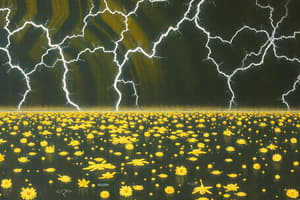Podcast
Questions and Answers
What concept in physics describes how electrically charged particles interact with each other?
What concept in physics describes how electrically charged particles interact with each other?
- Gauss's Law
- Newton's Third Law
- Ohm's Law
- Coulomb's Law (correct)
What happens when two similar types of electrical charge get close together?
What happens when two similar types of electrical charge get close together?
- They repel each other (correct)
- They create a magnetic field
- They cancel out each other
- They attract each other
How is Gauss's Law used in physics?
How is Gauss's Law used in physics?
- To calculate electric field strength
- To calculate magnetic field strength (correct)
- To calculate gravitational field strength
- To calculate force between charges
According to Gauss's Law, what must be the total amount of magnetic lines of force going through any closed surface?
According to Gauss's Law, what must be the total amount of magnetic lines of force going through any closed surface?
When two objects with a large amount of attraction move closer to each other, what does this imply?
When two objects with a large amount of attraction move closer to each other, what does this imply?
What is the main purpose of Gauss's law?
What is the main purpose of Gauss's law?
How does understanding Gauss's law benefit scientists?
How does understanding Gauss's law benefit scientists?
What do electric charges primarily create between themselves?
What do electric charges primarily create between themselves?
Based on the text, what can be inferred about magnets?
Based on the text, what can be inferred about magnets?
How do electric charges interact with each other?
How do electric charges interact with each other?
Flashcards are hidden until you start studying
Study Notes
Electric charges and fields are fundamental concepts in physics that describe how electrically charged particles interact with each other. Electrical charge is associated with matter that has either positive or negative electricity, which we call protons or electrons. When two opposite types of electrical charge come near each other they attract one another; if two similar types of electrical charge get close together, they repel each other. These interactions cause forces between things that have different amounts of electrical charge. A force always acts from one thing towards the other, so when there is a large amount of attraction between two objects, both will move closer to each other until their attractions balance out. This action-reaction principle means that anything you do causes something else to happen. In this case, getting some charges very near would make them want to pull apart because they would feel like they were being pushed together by their strong attraction.
Gauss's Law is used to calculate how much magnetic field strength is needed to keep something balanced up in space where it goes around the Earth. It says that the total amount of magnetic lines of force going through any closed surface must be equal to zero. That means that the sum of all the line strengths coming into your area equals the amount leaving again. So, if a magnet is drawing more lines downward into your room than it is pulling upward, then you know that your room has more lines going out than coming back. And since magnets cannot be broken, you can tell whether or not your room has enough magnetic force to lift everything off its floor without falling down!.
In summary, electric charges create attractive and repulsive forces between themselves due to their opposing natures. They also give rise to electric fields, which exert forces on other nearby charges. Additionally, Gauss's law helps us determine the strength of magnetic fields within particular areas. Understanding these principles allows scientists to predict how objects with specific charges behave under certain conditions, while also providing insight into various natural phenomena involving electricity and magnetism.
Studying That Suits You
Use AI to generate personalized quizzes and flashcards to suit your learning preferences.




